Is it safe to use protein powder if you have thyroid disease?
Is animal protein better than plant protein? Which one is ideal if you have thyroid disease?
How much protein should you consume each day? And will it help you with weight loss?
All of these questions are more will be answered in this article.
But to the point:
Yes, you can and should consume plant-based protein if you have thyroid dysfunction as it can potentially help you manage your weight and help you feel better.
The specifics are a little bit more complicated so let’s dive in to help you gain a better understanding:
DOWNLOAD FREE RESOURCES
Foods to Avoid if you Have Thyroid Problems:
I’ve found that these 10 foods cause the most problems for thyroid patients. Learn which foods you should avoid if you have thyroid disease of any type.
The Complete List of Thyroid Lab tests:
The list includes optimal ranges, normal ranges, and the complete list of tests you need to diagnose and manage thyroid disease correctly!
5 Big Benefits of Protein Powder & Why Thyroid Patients Should Use It
Using the right protein powder on a daily basis can have big benefits for your weight, your thyroid, your metabolism, and more.
Check out the potential benefits that you can expect to see if you are using protein powder correctly:
#1. May Enhance Weight Loss & Improve Metabolism
If you are like many thyroid patients then you are probably struggling with weight gain.
Protein powder definitely has the potential to help with weight loss because it impacts your body and metabolism through a variety of different mechanisms.
One of the most important factors in controlling your weight has to do with your basal metabolic rate or BMR.
And a huge contributing factor to your BMR is your lean muscle mass.
The more lean muscle mass that you have on your body, the more calories you will burn at rest.
Consuming a sufficient amount of protein can help support lean muscle mass which may then have an impact on muscle mass.
The more muscle mass you have on your body the better, especially if you are struggling with weight.
If you are trying to lose weight then you should also check out additional weight loss supplements that work through different mechanisms.
Other supplements including berberine, fish oil, probiotics, CLA, and glucomannan all work through different mechanisms and can be safely used in conjunction with protein powder.
You can also consider adding other prescription weight-loss medications to your protein powder to enhance weight loss.
#2. Can Help Control Appetite
Another way that protein powder can help with weight loss is through its impact on your appetite.
It’s no secret that protein, in general, has a powerful impact on appetite control.
In fact, compared to fat and carbohydrates, protein exerts an even more powerful appetite suppressant-like effect.
This is great for thyroid patients because it allows them to regulate cravings for sugary foods and sweets while also putting things into their bodies that taste great and may improve thyroid function.
To get the most benefit, eating a protein smoothie at the beginning of the day can help provide your body with healthy whole foods while also naturally suppressing your appetite throughout the day until lunchtime.
You can get a list of thyroid-friendly whole-food smoothies here.
#3. Easy way to get more Nutrients
Using a protein powder every day is an easy way to ‘sneak’ in nutrients that would otherwise be difficult to get.
What do I mean?
Protein powders often taste very good which means you can hide other not-so-good-tasting supplements or ingredients inside of them.
Ingredients such as prebiotics, probiotics, iodine, adaptogens, botanicals, and other nutrients can all be placed inside your protein powder or consumed at the same time.

This is great because it helps to provide you with more of the nutrients that your thyroid needs without sacrificing taste.
And let’s get real for a second:
Healthy supplements don’t always taste very good so this is a huge plus.
You may be able to choke down some unpleasant nutrients for a few days but what happens when it’s day 30 of the same nasty-tasting ingredient?
Life gets a lot easier when things both taste good AND are healthy.
#4. Quick and Easy to Prepare
Another big benefit is that you can easily prepare a protein shake with just a few ingredients.
I know from personal experience that eating healthy can be hard.
The last thing you want to do when you get home from a long day is to spend 30 minutes cooking a healthy meal.
You can bypass the cooking process by throwing together a quick protein smoothie.
Put some water or juice into a blender, throw in 1-2 scoops of protein powder, add some frozen fruit and you have a delicious meal that will help keep you full for hours.
#5. Tastes Delicious!
And lastly, another huge benefit is obviously the taste!
Eating healthy food can definitely be tasty, but it requires that you have a working knowledge of how to cook and how to combine flavors, herbs, and spices.
For some people, this can be difficult and it can make eating healthy not quite as appetizing (or as easy) as simply eating unhealthy food.
Protein powder can make this transition much easier because it makes creating healthy and good-tasting food much easier.
Plant-Based Protein vs Animal Protein
If you’re on the protein powder bandwagon then you are probably asking yourself how you can get your hands on some protein powder.
Well, not so fast because there are a few things we need to discuss.
The first has to do with the type or SOURCE of protein powder.
When it comes to protein powder sources, there are two broad categories to choose from:
Animal-based protein powders and plant-based protein powders.
Plant protein comes from peas, hemp, brown rice, soy, quinoa, amaranth, oats, chia seeds, and even legumes/beans.
Even though these are all potential sources of plant protein, most plant protein powders contain large amounts of pea, brown rice, and soy protein in various concentrations/ratios.
On the other side, you also have the option of getting your protein powder from an animal source.
Animal protein predominately comes in the form of whey (from dairy) but you can also find egg-based protein powders, collagen protein powders, and even hydrolyzed beef protein powders.
Each of these protein powders has a list of pros and cons that go along with it and for thyroid patients, the cons of animal-based protein powders usually outweigh the pros.
Even though animal protein powders can work great for many people, thyroid patients often do better with plant-based protein powders for a few reasons:
#1. Most animal-based protein powders come from whey which is a source of dairy.
And we know that thyroid patients often have a hard time digesting and utilizing dairy products because they can cause intestinal issues and potentially exacerbate immune function (4) in certain people.
We even have some studies showing that patients with Hashimoto’s thyroiditis who remove dairy from their diet see an improvement in thyroid function in a relatively short time frame.
And before you think you don’t have to worry about this because you don’t have Hashimoto’s, think again.
The #1 cause of thyroid disease in the United States and other developed countries is Hashimoto’s thyroiditis so there is a big chance that you have this condition whether you realize it or not.
#2. Thyroid patients tend to have issues with digestion/absorption of nutrients/foods due to low stomach acid from low thyroid function.
Low thyroid function results in decreased acid production in the stomach.
This reduction in acid can make it difficult to break down foods into their core components for absorption into the body.
And because not all protein powders are as easily digestible as others, this is something to consider if you have thyroid problems.
For most people, plant-based protein powders are more easily absorbed compared to animal protein powders.
This means that most thyroid patients will have an easier time getting the nutrients and protein from their protein powder into their bodies compared to animal protein powders like whey.
And #3. Animal protein can sometimes result in bloating, distention, or abdominal cramping.
Remember when I mentioned that plant protein is often better absorbed compared to animal protein?
A lot of this has to do with the concentration of bacteria in your gut known as the microbiome.
Thyroid patients tend to suffer from overgrowths of certain types of bacteria (and even fungus) which prefer certain types of foods.
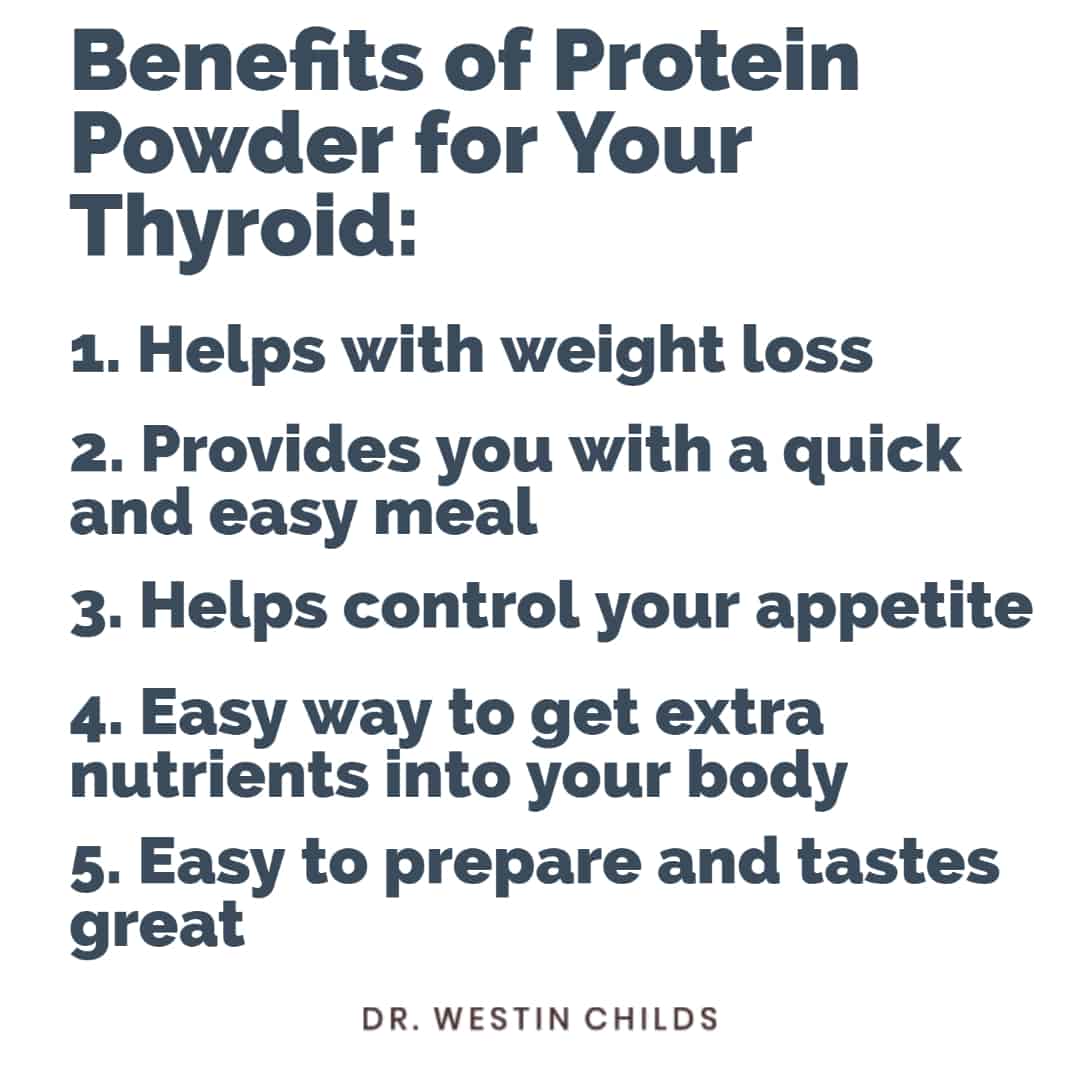
Food that the bacteria feed off can result in the formation of gas which results in distention, bloating, or cramping.
Because plant-based protein powders contain different compounds and an array of amino acids, they are utilized differently in the gut.
In addition, some thyroid patients suffer from food allergies or food sensitivities which can cause similar symptoms.
In general, dairy and whey tend to cause more issues for thyroid patients compared to plant protein but both can potentially cause problems!
How Much Protein Should You Consume Daily?
It’s always possible to do too much of a good thing but when it comes to protein, I find that most people are not consuming enough.
You can find out if you are consuming enough protein in a couple of different ways:
The first is that you can let your body weight and muscle mass be your guide.
Your goal, when consuming protein powder, is to find the amount of protein you need to maintain your muscle mass (6).
This is a little bit complicated because it requires you to have an understanding of the percentage of fat in your body and the percentage of lean muscle mass which means you will need to track it.
The amount of protein you consume will depend on whether or not you are trying to lose weight, build muscle mass, or maintain muscle mass.
Because this option is somewhat more difficult to track, you can use a more general rule to guide your protein intake.
That general rule is to consume 1 gram of protein for each pound that you weigh.
If you are overweight then you will want to use your target weight as your protein goal as opposed to your current weight.
Imagine that you are a woman with thyroid problems interested in losing weight.
Your current weight is 175 pounds but your target weight is 145 pounds.
In this situation, you would try to consume 1 gram of protein per pound up to 145 pounds.
So your daily protein goal will be around 145 grams of protein.
Of this total percentage, around 60% should be from whole foods and around 40% should be from protein powder.
This is going to seem like a lot of protein for many people, especially women who aren’t used to consuming high quantities of protein but it’s not as difficult as you may think, especially when using protein powder.
2-4 scoops of protein powder can easily provide your body with up to 40 to 80 grams of protein each day.
If you are having trouble hitting these levels of protein intake then shoot for something more manageable such as 0.8 grams of protein per pound of body weight (or target body weight, if you are overweight).
Using the example above, 0.8 grams of protein/pound of body weight gives you a total of 116 grams of protein per day instead of 145.
This value can be obtained by multiplying your ideal body weight by 0.8.
Consuming high quantities of protein can really help build muscle mass, suppress your appetite, control your weight, and improve your thyroid.
Can Protein be Used as a Meal Replacement?
Yes, you can definitely use protein powders as a quick meal replacement provided you aren’t over-restricting your calories in the process.
As has probably become evident, increasing your protein intake is one way to help support your thyroid and manage your weight.
And consuming protein powder is one way to make this process even easier.
If you want to go this route, here are a few tips:
- Don’t over-restrict your calories by more than 10% of your daily needs as doing so is likely to hurt your thyroid and cause more harm than good in the long run.
- Make sure that you are getting at least 100 grams of protein each day. This is critical as it prevents muscle loss!
- If you want to use protein powder as a meal replacement then I would recommend doubling up and using 2 scoops instead of one. This will help you get around 30-40 grams of protein for the meal that you are skipping.
The Best Protein Powder for Thyroid Patients Is…
The best protein powder is one that works for your body, one that tastes good to you, one that you want to use daily, and one that provides your body and thyroid with the nutrients that it needs.
For most of you, that will mean using a plant-based protein powder but there are a handful that will be able to get by using whey or other forms as well.
But given that whey-based protein powders tend to cause problems for the majority of thyroid patients, I think it’s best to start with the plant-based powders first.
If you absolutely can’t tolerate the taste or chalky texture then you can always try the animal-based versions.
I’m a little biased, but I think this is the best protein powder for thyroid patients.
Yes, I created it, but I created it specifically for thyroid patients and it’s the powder that I personally use daily.
Why?
Because I know how important optimizing thyroid function is for long-lasting weight management.
Conclusion
Almost every thyroid patient can stand to benefit from the use of protein powder as a part of their daily supplement regimen.
Whether you are looking for weight loss, more energy, or a quick and easy snack, protein powder can help you.
My recommendation is that you stick to supplements that contain plant-based protein, which contain additional ingredients, and which do not contain products that can cause negative reactions (gluten, dairy, and soy).
If your goal is weight loss make sure that you do not use protein powder as a meal replacement! Instead, use it as a snack or as a supplement to a whole-food smoothie in the morning.
Now I want to hear from you:
Are you currently using protein powder?
Is it working to help your thyroid?
Are you experiencing any negative symptoms such as nausea or headaches afterward?
What type of protein are you using?
Leave your questions or comments below!
Scientific References
#1. https://www.ncbi.nlm.nih.gov/pmc/articles/PMC5435852/
#2. https://www.ncbi.nlm.nih.gov/pubmed/24078411
#3. https://www.ncbi.nlm.nih.gov/pubmed/16571087
#4. https://www.ncbi.nlm.nih.gov/pmc/articles/PMC3916846/
#5. https://www.ncbi.nlm.nih.gov/pmc/articles/PMC5372973/
#6. https://www.ncbi.nlm.nih.gov/pmc/articles/PMC3518828/
#7. https://www.ncbi.nlm.nih.gov/pubmed/8923841
#8. https://www.ncbi.nlm.nih.gov/pmc/articles/PMC3943438/
#9. https://www.ncbi.nlm.nih.gov/pubmed/27885532
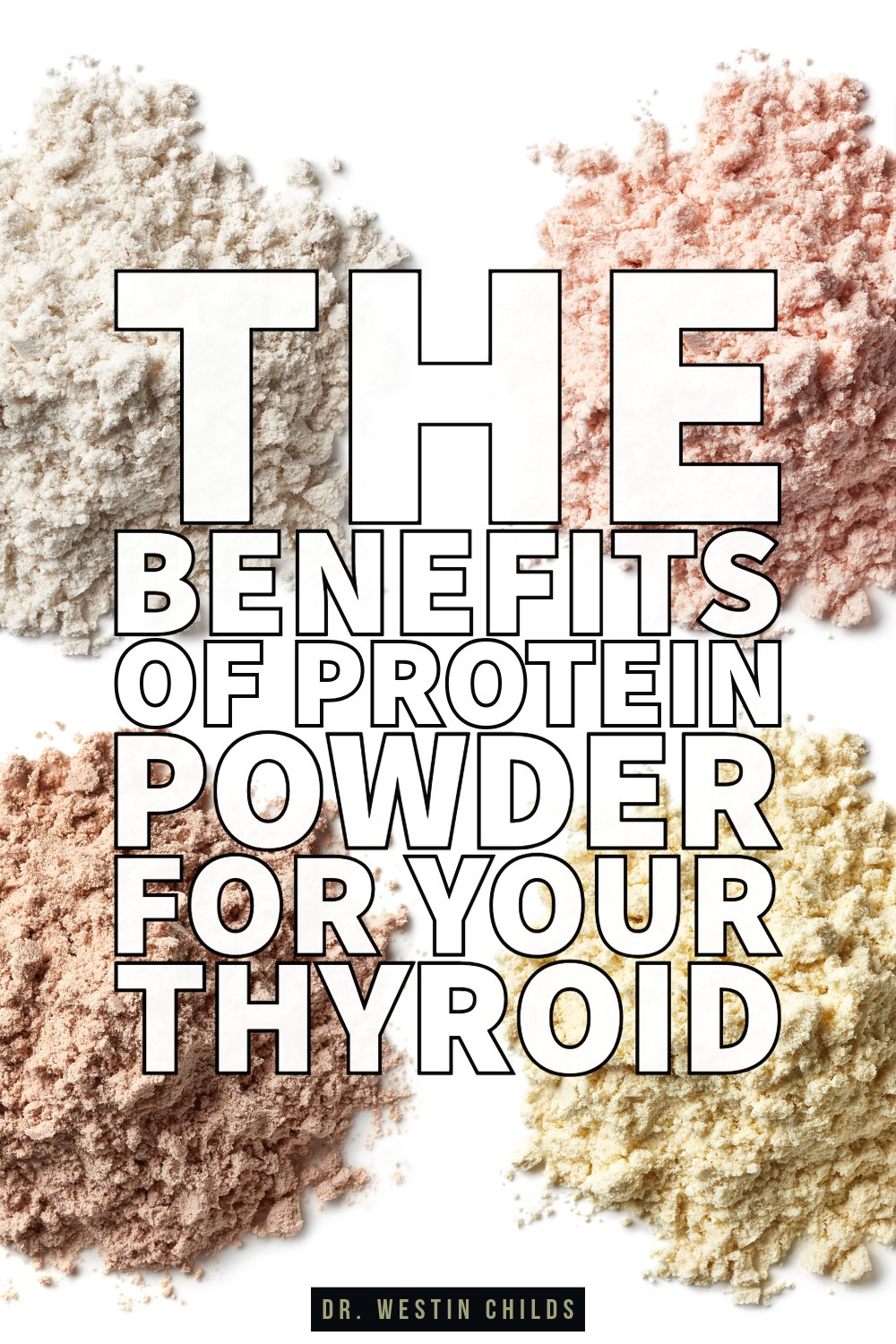
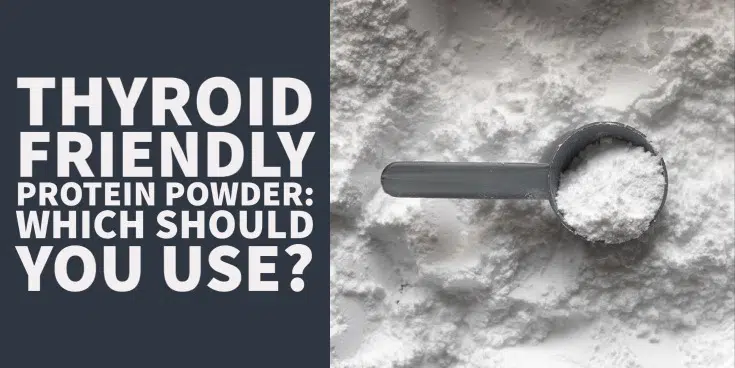


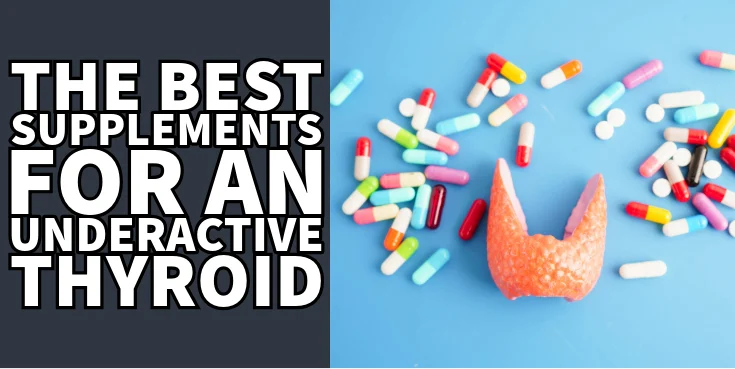
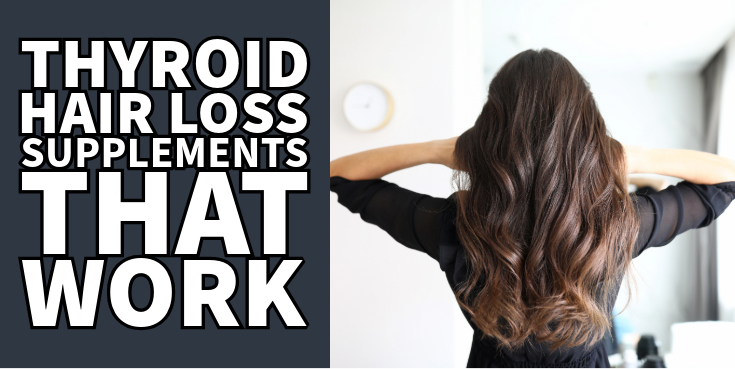
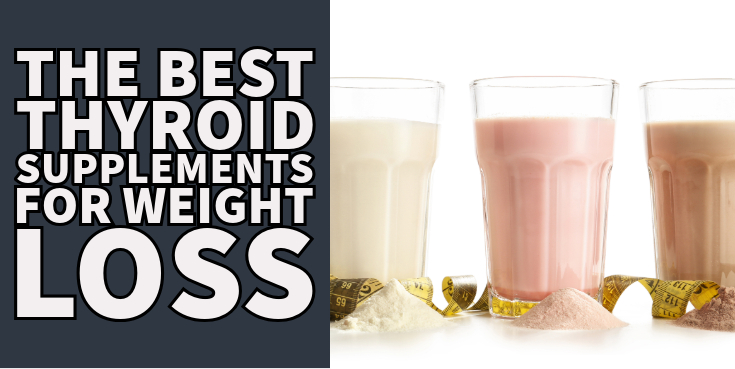
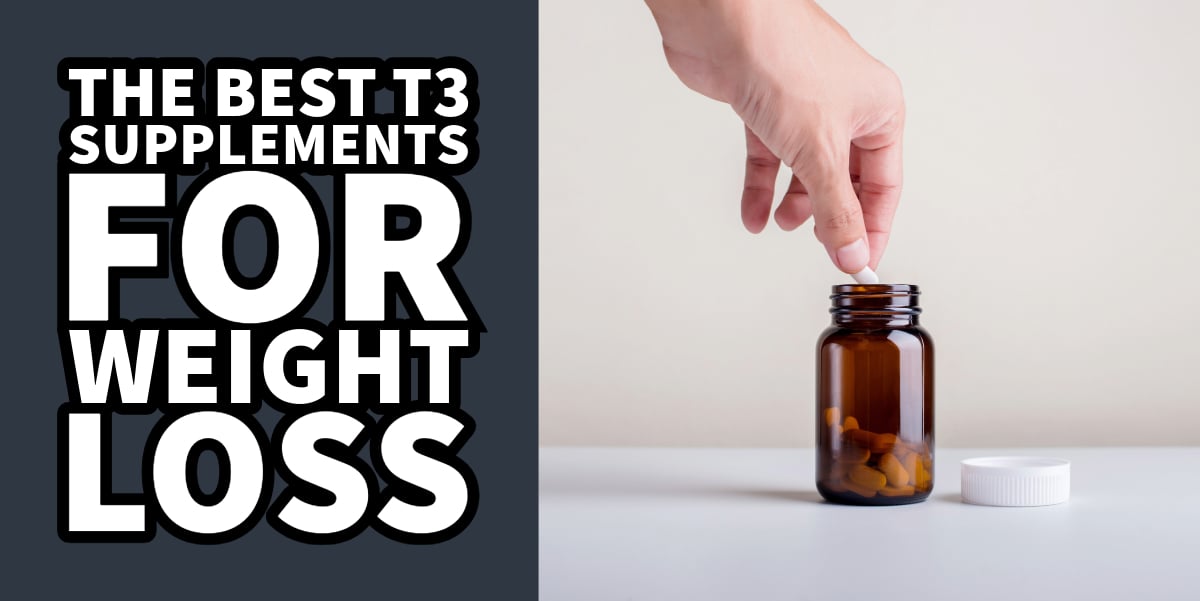
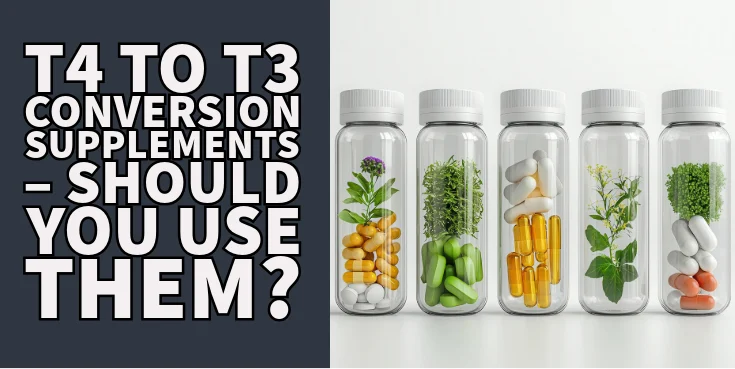

I am currently using Ancient Nutrition Bone Broth Protein. How does this compare to your protein? I can’t tell it it is helping my thyroid.
Hi Karen,
Bone broth protein usually contains collagen as the protein source. This protein powder contains plant-based protein with other nutrients and anti-inflammatory ingredients. While they are both protein powders, they serve different purposes.
Last Oct/Nov I began Optifast to drop weight not realizing I had a cause for gaining over 60 lbs in less than two years. I went from a very fit person to an obese person. It was tragic. Optifast is a mainly liquid based diet of about 800 calories per day with some protein bars as well. The program includes initial bloodwork which found I have the thyroid antibodies (TPO 195) and a TSH 6.602. So, I’m fairly new in all this.
My Optifast doctor was not keen on diet as a solution. When I saw one of your videos that mentioned low cal diets are not good, I dropped Optifast. Unfortunately, I’m gaining weight again.
So, I’ve been on the hunt for weight loss diets with Hashimoto’s in mind and came across a program that requires their own protein powder.
Can I use your protein powder for another program’s recipe? I am pretty sure those recipes are not counting on flavor from the protein powder.
Thank you for your hard work in educating us on the thyroid and Hashimoto’s! I truly appreciate it!
Hi Audrey,
I’m glad you aren’t doing the optifast program because that would have only caused further problems for you down the road. In terms of mixing and matching protein powders, that’s probably okay, but it depends on the program. Just be wary of gimmicky diets as most of them focus on the wrong things.
You can learn more about how to use diet effectively for weight management here: https://www.restartmed.com/hypothyroidism-diet/
Thank you Dr. Childs. I decided to do your program instead and already ordered the supplements including your protein mix here. In fact, it’s due to deliver today. I’m excited. I’ll try to remember to pop back to these posts to let you know how it goes.
My husband is going to follow the plan with me though he doesn’t have a thyroid issue. He wants to drop about 20 lbs. Should he take any supplements as well or is he good on his own? I don’t think you ever covered that – if a spouse does the diet (including the fasting) with you but doesn’t have Hashimoto’s or thyroid issues.
Thank you! I’m excited to get started. What sold me is all the information you have on the thyroid. It’s geeky and awesome. I learned so much in such a short time and appreciate all you do! Thanks!
Ok, sounds good! And yes, the program definitely works for those with functioning thyroid glands. In order to create the program initially, I tested it on myself as well as a large group of ‘healthy’ people first. As a man, he probably needs to do less than a woman to obtain the same or better results. So the supplements would help but are probably not necessary.
And yes, please do keep us updated on your progress/results.
Kind of bummed that I did not see your site before purchasing a Pea Protein powder. It seems similar to what you have, but it’s not so focused on the thyroid. I just completed 4 months of candida clean up and looking to stay clean going forward. I would like to learn more about any supplements I may need to keep Hashi’s in check. Candida clean up resulted in 17 lb weight loss. I hadn’t been able to lose weight in more than 10 years.
Hello Dr Childs,
Thanks a ton for this article?
1) how do one can know whether you tolerate whey protein or not ? Any reactions one typically experience? I am trying to find how can one know lets say by some blood tests whether whey protein is helping or disturbing your hormones/inflammation etc?
2) How far away one should take whey protein from levothyroxine and levothyroxine dose?
Thanks a ton
Anu
I have been using plexus protein. Taste good. I have been reading your posts alot and it has me questioning my endocrinologist. Where can I find the protein powder that you posted?
Hi Jennifer,
You can find it here: https://www.restartmed.com/product/functional-fuel-complete/
Hello, this link is not working for me. Could you please write a name of this powder please?
Hi Eva,
The protein powder listed here is currently unavailable but I will have a replacement option available in a few weeks. Once it is available, I will be able to update the link.
How does the biotin in this affect thyroid medication and absorption? I know biotin usually causes the body not to absorb most thyroid replacement hormones. How is this biotin any different from others?
Hi Jodi,
Biotin has no impact on thyroid hormone absorption. It merely interferes with the thyroid hormone testing assay but has no actual effect on your thyroid hormones: https://www.restartmed.com/biotin-and-thyroid/
Be sure to tell people not to drink this for a few days before blood work. I’ve had a doctor increase meds thinking I needed it because the biotin made my results go through the roof. I had terrifying heart palpitations because I didn’t need my meds increased we discovered after I quit using biotin.
Hi J,
Biotin actually makes your thyroid look better than it is, so your doctor would decrease your dose based on those lab tests. The reason is that biotin binds to the assay and falsely elevates the lab tests, not the other way around.
You are 100% correct that avoiding biotin 2 days prior to when you get your labs drawn is usually a good idea 🙂
Hi, I don’t understand why you have put dried cane syrup and coconut oil into this. Coconut is an issue to many thyroid patients and cane sugar/syrup is really toxic. Personally, the least amount of sugar takes my body days to recover and I am left with infections that take a long time to heal. Then I have an issue with the iodine, unless tested it is too easy to overdose on iodine. I was hoping your protein powder would be the perfect one I was searching for.
Hi, Dr Childs,
I am a client who purchased an item from your supplements. I also read your articles. They are so helpful. I just read and listened to your discussion on protein powders. I thought you mentioned you had formulated one that meets all the qualities. However, I do not see it. Can you provide that information with the name and how to order it.
I appreciate your time.
Hi Gina,
Of course! I have three protein powders for thyroid patients.
If you are looking for an everyday protein powder then this is best: https://www.restartmed.com/product/functional-fuel-complete/
If you are looking for a protein powder to help with detoxification and with gut health then this is best: https://www.restartmed.com/product/functional-fuel-detox/
Hi Dr, is it okay for my plant based protein powder(Owyn vanilla) to contain a greens blend of spinach, Kale & broccoli? I’m scared that’s gonna make my hypothyroidism worse. Since they say those veggies aren’t good for us. Thanks!
Hi Tiffany,
It’s theoretically possible that they may cause issues but in reality, it’s quite rare as long as you are consuming enough iodine. You can read more about how goitrogens impact your thyroid here: https://www.restartmed.com/goitrogens/
Garden of Life Raw Organic Plant Based Protein Powder I just purchase this. Is it ok for hypothyroidism? I’m doing intermittent fasting I only eat between 12-8pm I consume two proteins shakes and one meal before 8
Hi Cherniara,
I’m not really familiar with the brand so I can’t say for sure. You can use the information in this article to help you determine if it’s a good one or not, though.
Ihave been using Orgain collagen with 50 superfoods – free of gluten, soy, etc. is it safe? Iam not in thyroid meds yet, but have a high TSH.
Hi Mary,
I’m not really familiar with the brand/product but as long as it follows the guidelines listed in this article and it’s helping you feel better, then it should be fine.
I had my thyroid removed in 2021 I’ve since found out I have a bacteria in my small intestine , which I took meds for I definitely have a dairy intolerance I’ve never had a weight problem but notice the pounds are appearing with the bloating and discomfort I would like to clean up my act but want to do it right as I am on thyroid meds for the rest of my life I would like to loose 10 to 15 lbs and feel good overall
Hi Donna,
I would recommend checking out these therapies: https://www.restartmed.com/natural-thyroid-remedies/
What protein powder would be good to take? I have low thyroid and taking synthroid Was taking Garden if life with greens.. thank you
Hi Lois,
I would recommend this one or one like it: https://www.restartmed.com/product/thyro-fuel/